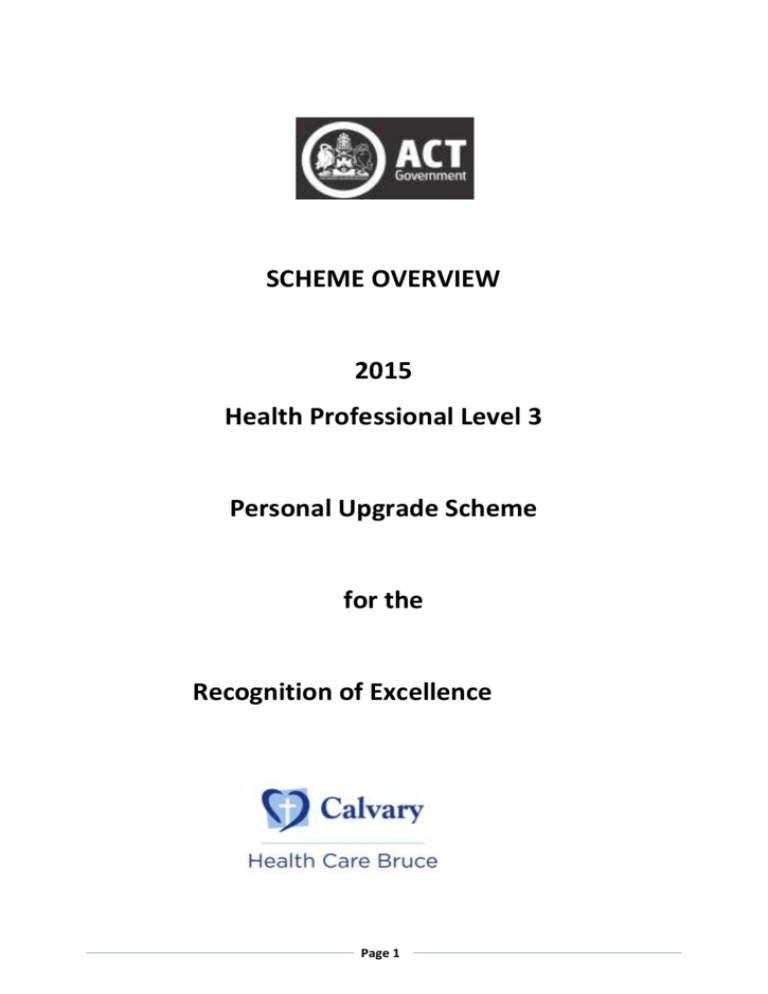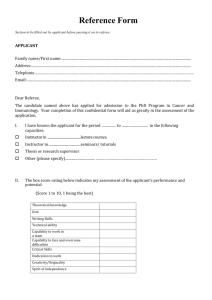Scheme Overview - ACT Health
advertisement

SCHEME OVERVIEW 2015 Health Professional Level 3 Personal Upgrade Scheme for the Recognition of Excellence Page 1 Introduction The Health Professional Level 3 Personal Upgrade for Recognition of Excellence Scheme was conceived as a result of feedback received during the 2003 ACT Health, Review of Health Professionals and related classifications. The feedback from staff at the time indicated that there was limited opportunity for organisational recognition in a manner that acknowledged professional excellence. In most Health Professional professions, at the time of the review, career opportunities were often limited towards moving into a management career rather than one within the profession in which the individual had originally trained. The introduction of the Health Professional classification with the streaming of either management, professional or educator pathways at the Health Professional level 4, where the organisation requires these skills, has in part met this need. What was also clearly articulated through feedback provided by Health Professional staff was that there was limited ability to recognise and reward individual professional achievement. Achievement was usually recognised only within workgroups or professions. A follow-on was that, due to the lack of ability to promote an individual’s achievements, high achieving staff would often look for recognition elsewhere, including exiting the service to pursue academic careers, or moving to jurisdictions where the ability to apply through an existing process for recognition was available. The Scheme has been operational since 2006 and in 2014 was subject to a formal review. Recommendations from the review are yet to be finalised and any endorsed outcomes will not impact the Scheme’s operation in 2015; the Scheme will operate in accordance with the current guidelines for the 2015 round. Page 2 Objectives The scheme aims to recognise and reward the efforts of eligible Health Professional level 3 staff that have achieved excellence in skills and competence through post-graduate study, research and/or skill acquisition relevant to their profession and service, through a process of salary advancement. The objectives of this scheme are: To recognise advanced skills, clinical leadership and contribution to the workplace. To assist in the retention of experienced Health Professionals. To provide a mechanism to encourage employees to undertake desirable training to update skills, knowledge and practice in areas of organizational need. Achievement of recognition of excellence will be assessed based on two fundamental concepts: 1. The contribution the employee has made to professional practice as well as meeting research, teaching or specialist professional needs of the workplace and hence the organisation, and 2. The extent to which the employee has contributed to their agencies’ business, strategic plans and priorities. The Scheme recognises contribution to the service through: Professional leadership via specialist or broad generalist knowledge, skills and experience, as applied in their workplace. Further clinical study through possession of relevant post-graduate qualifications, research and publications. The teaching and development of others in the workplace. The Scheme envisages necessarily high standards to ensure the integrity and recognition of only those employees who are truly performing at a level of outstanding achievement and professional excellence. In saying that, it should be recognised that the scheme is not linked to length of service. Page 3 Objectives Permanently appointed eligible Health Professional Level 3 (pay point 3) employees (either full-time or part-time) must demonstrate to the Assessment Panel that they are performing at a level consistent with the assessment criteria on an ongoing basis. Successful applicants will be advanced past the competency assessment barrier to HP3 pay point 4 (HP3.4). Further progression to the fifth pay point (HP3.5) will be subject to normal incremental arrangements. Preliminary Considerations Any individual, who believes they will satisfy the requirements of the Scheme, should firstly discuss their proposed application with their professional supervisor and or manager. Follow-up should also occur early in the application process with the Scheme Secretariat (phone 6205 2494). The HP3 Upgrade assessment process is not a substitute for workplace performance management and supervisors can assist aspring applicants as follows:. Assessing applications critically Support training and development opportunities to meet the chosen elective criteria, where possible. Proactively utilise performance management systems. Where previous application has been unsuccessful, discuss panel feedback with applicant and propose action where appropriate. Eligibility To be eligible to submit an application to the HP3 Personal Upgrade an applicant must: Be permanently appointed at the Health Professional level 3, and Not be subject to a current under-performance process, and Have served a minimum of 12 months at HP3 pay point 3 in the ACT Government and/or Calvary Health Care Bruce, as at closing date of 30 June 2015. Page 4 Jurisdictional Equivalence If you have not been at HP3.3 for the required minimum 12 months and believe that your employment immediately prior to joining ACT Health was of equivalent work level standard and of sufficient duration to bring your ‘equivalent experience ‘ up to the minimum 12 months required, please contact the Scheme Secretariat as soon as possible to discuss your individual situation. The onus of proof is on the individual applicant to demonsrate equivalence. Assessment of equivalence is undertaken by the Assessment Panel as a separate process to assessment of your application. Assessment Criteria The assesssment criteria have been written to encompass a wide variety of professions and roles covered by the umbrella of “Health Professional”, and hence they are neither detailed nor specific to any one type of job. Applicants must interpret each criterion in relation to their own achievements within the ambit of their particular positions in either the Health Directorate, Community Services Directorate, Education and Training Directorate, Justice and Community Safety Directorate or Calvary Health Care. Applicants must also provide examples of how they meet each criterion, list achievements and outcomes, and where required provide documentary evidence (e.g. copy of further qualification, conference papers etc) to substantiate claims. The application and supporting evidence must be provided in accordance with the Scheme’s “Document Submission Guidelines”. The Assessment Criteria are in two parts: Part 1 and Part 2. Part 1 comprises two MANDATORY CRITERIA that every applicant must address. Part 2 comprises 10 possible ELECTIVE CRITERIA from which applicants must select and address two out of these ten criteria. The choice of which two criteria the applicant addresses rests with the applicant. Page 5 a) Mandatory Criteria Consistent with the fundamental principles underpinning the Scheme, the two mandatory criteria attempt to draw out the tangible ‘added’ value of the applicant to the area in which they work. This includes the specialist or generalist professional skills, as well as service changes and improvements as a result of the applicant’s work. b) Elective Criteria 1. Leadership 2. Research and Publication 3. Qualification and Development 4. Teaching and Education. The above headings are only intended to give a quick snapshot of the areas of professional excellence covered by the Scheme and full details of both the mandatory and elective assessment criteria are detailed in the companion document “Explanatory Guide to the Assessment Criteria”. Application Process Submissions will be called for annually. Employees wishing to apply for a HP3 personal up-grade will need to obtain a copy of the application documentation from the ACT Health Directorate website via the link http://health.act.gov.au/professionals/allied-health/hp3-personal-upgrade-scheme The information can also be obtained by contacting the ACT Health Chief Allied Health Office on 02 6205 2494. The initiative for preparing and submitting an application rests with the individual applicant and applicants are required to contact the Scheme Secretariat as soon as possible after appliacitons open to confirm their eligibility to apply. Assessment will be through written application only and the written application is critical to the success or otherwise of an applicant’s case for a personal up-grade. Page 6 Applicants must ensure that they convince the panel, through their application, that they meet each criterion to the standards required, and can support each claim with evidence. It is essential that the content of the application reflect the contribution of the applicant at their substantive level and not the level in which they are/have been acting (i.e. HDA). Applicants are advised that their achievements will be assessed in terms of contributions made to the need of their particular workplace, discipline and service, and the extent to which they contribute to their agency strategic plan and priorities. Applications must include the following: 1. A fully completed application cover sheet with sign-off from the applicant’s supervisor/manager; and 2. Letter from Shared Services Payroll or Calvary Health Care Bruce Payroll confirming perment employment as HP3.3 for a period of at least 12 months as at the closing date 30 June 2015. 3. A fully completed section addressing the assessment criteria, with sign-off from their professional supervisor/manager at each criteria; and 4. Inclusion of supporting material; and 5. A typed and signed referee report addressing the assessment criteria. All parts are required to be submitted electronically in accordance with the Scheme’s “Document Submission Guidelines”, Applications that are not complete or do not meet all process requirements will not be assessed. Presentation of Application Place each assessment criterion on a separate page with the assessment criterion number and description at the top of the page. Where appropriate, use dot points in the answer. Do not submit in hard copy Page 7 Assessment Process Panels Assessment panels, endorsed by the relevant agency, will comprise a senior Health Professional Manager, a Human Resources or union nominated representative, and a representative from the relevant profession. Panel member(s) from the applicant’s Directorate are included in the above mix. The Senior Health Professional may be internal or external to the applicant’s Directorate and will sit on a number of different panels to assist with consistency. The profession specific representative may be internal or external to the applicant’s Directorate and, where possible, this representative should be external to the applicant’s immediate work area. Where there is no available representative due to a profession comprising small numbers, a ‘related’ representative may be considered. Panel members must declare any past or present personal or working relationship with any applicant. Any association or conflict will be noted in the panel’s documentation. The Chair of each panel will be the Senior Health Professional Manager. All panel discussions will be confidential. Assessment Primary examples of achievement should be from within the last 5 years and the panel will be looking for evidence of performance and sustained achievements. Applicants need to provide evidence of their achievements and outcomes and these must be validated by their professional supervisor/manager and separately by a referee. Page 8 Validation of Claims An applicant must have their coversheet and their claims against each of the assessment criteria signed off by their immediate supervisor/manager as being true and accurate. The supervisor or manager must be at HP4 or above classification (or equivalent). Where the supervisor or manager is acting in their position, they must have been in that position for a minimum of 6 months. Where a manager has indicated that they do not support an application, the applicant may still submit the application to the panel for assessment. In addition to having the claims validated, applicants must provide a referee’s report. The referee cannot be the supervisor/manager who signs off each criteria. If there is an issue in terms of obtaining a suitable referee from the immediate work area, the applicant is encouraged to identify a referee who can validly attest to the information contained within the application. The referee report should relate directly to the information included in the application, and the referee’s own independent opinion. Referees need to be able to directly comment on the majority of the application. As such, it is recommended that referees have both a current and recent knowledge of the applicants’ work. A referee should read the application prior to completing their report. Referees may be of HP3 or equivalent classification, or above. Panels may consult with an applicant’s referee and professional supervisor/manager if clarification/verification of an aspect of an application is required in order to make an assessment or recommendation. Panels may also choose to validate information in any other way. This may involve directly approaching the applicant’s workplace, with the approval of the applicant. Applicants are assessed on their stated achievements against the assessment criteria. There is no ranking or quotas. Page 9 Delegation and Notification The panel will make a recommendation to the delegates, based on the standard set of assessment criteria. The delegation for approval sits with the ACT Health Chief Allied Health Officer, the applicant’s Executive Director and the Deputy Director-General from the applicant’s respective Directorate. All delegates are required to note and endorse (or otherwise) the Panel’s recommendation. Endorsed applications must be signed off by all three parties before a successful applicant can be transitioned to the first competency point HP3.4. Payment at the higher rate of HP3.4 will be backdated to the first business day following the closing date of 30 June. Applicants will only be notified in writing of the decision once all delegates have signed off on the process and recommendation. Applicants should note that the panels will be joint union management panels, and as such there will be no appeal. Feedback Each applicant will be notified in writing of the outcome of the process, and is entitled to receive a written feedback summary from the panel. Applicants are not to approach individual members of the panel for feedback, as they are not permitted to breach the confidentiality of the process. Any requests for further information can be directed in the first instance in writing to the Scheme Secretariat. Mobility of Upgrade The personal up-grade will be portable within the ACT Government Public Sector. The underpinning philosophy is that the skills and attributes that an individual has demonstrated to achieve their personal upgrade should be transferable. Page 10 END DOCUMENT Page 11



